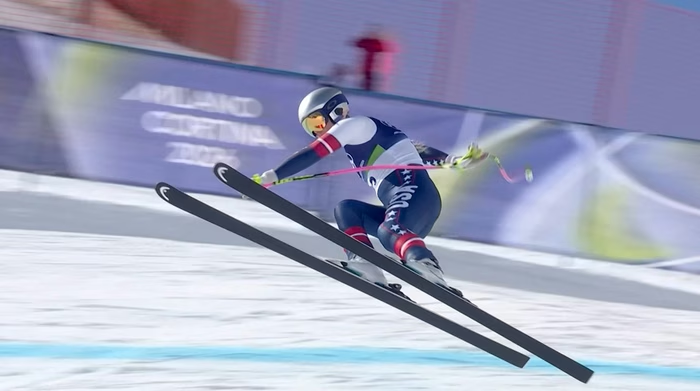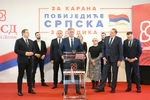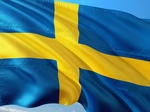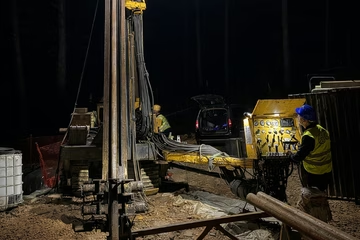Komsic at PACE: Concept of 'constituent peoples' being abused to undermine BiH
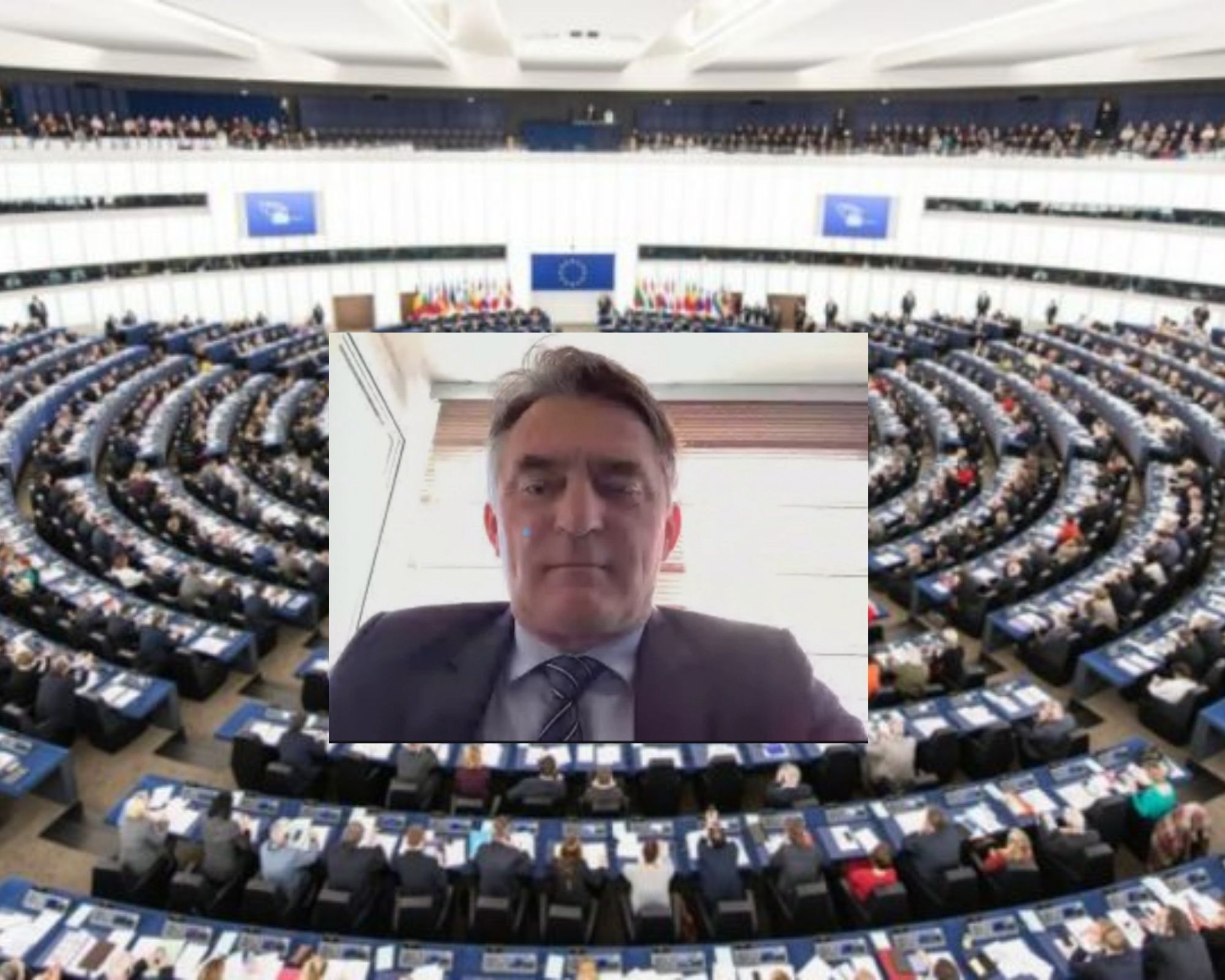
The policies of the 1990s that led to the war are still present in Bosnia and Herzegovina today, but the method of war to achieve certain goals has been replaced by political and diplomatic means and the abuse of the concept of 'constituent peoples', BiH tripartite Presidency Chairman, Zeljko Komsic, said in his address to the Parliamentary Assembly of the Council of Europe.
Komsic said that the 1995 Dayton Peace Agreement in Bosnia, which ended the war and contains the country’s Constiution, left “many open questions” and contains ambiguities which left a lot of room for various arbitrary interpretations, “most often inspired by the particular interests of different political elites, both in Bosnia and Herzegovina and in neighboring countries.”
"This constitution established a new political system in Bosnia and Herzegovina, which was supposed to evolve according to democratic standards and values, such as those contained in the goals of the Council of Europe. Unfortunately, that never happened,” he said.
Komsic argued that the opposite happened and that “ethnic policies active in Bosnia and Herzegovina have sought, and continue to seek to create an artificially divided and segmented society” dominated by the concept of belonging to one of the majority ethnic communities as the only valid statement for political action.
Although the European Convention on Human Rights and Fundamental Freedoms is an integral part of the Constitution of Bosnia and Herzegovina, it is, unfortunately, under-implemented in Bosnia and Herzegovina, he said.
The Presidency Chairman argued that the concept of “constituent peoples” is at the heart of the problem in BiH, adding that while the Constitution does contain this term, it is not legally defined.
“That is why a new legal practice has emerged, which I consider very dangerous, to achieve various political goals through the use of the term "constituency", in which domestic political actors participate, with visible political support from neighbouring countries," he said.
"It is obvious that the current political system in Bosnia and Herzegovina, based on ethnicity, creates three parallel totalitarian systems, based on the affiliation of one of the three ethnic communities, which it seeks to govern in an autocratic way. In such a system, by belonging to one of the ethnic communities as an expression of the exclusivity of ethnic policies, one actually seeks to take control of resources, jobs, tenders, public procurement, all kinds of privileges, profits or benefits, which clearly creates an environment for corruption of unimaginable proportions,” he stressed.
Komsic said that, instead of evolving the political system of Bosnia and Herzegovina into one based on democracy and the rule of law, BiH has 26 after the Peace Agreement taken a “regressive path” in which and is moving away from democracy as there is an effort to “maintain and even strengthen the ethnic political system which generates corruption in all parts of society, through the use of ethnic policies and the manipulation of fear by members of different ethnic communities.”
“That is why it is important to say that when those ethnic policies in Bosnia and Herzegovina have exhausted all other tools to control their ethnic community, they reach for emotions and empathy within their communities. This is achieved through the production of fear, which ultimately forms a system conducive to corruption and denial of the rule of law. I believe that we share the same opinion, such a political system has no place in modern Europe,” he said.
Komsic argued that proposals to introduce a system of consociational democracy similar to the political systems of Belgium, Switzerland or Northern Ireland are not feasible in BiH since there are policies within the country that deny the existence of the Bosnian state.
"Today, I want to say that I am a Bosnian and Herzegovinian by nationality and an ethnic Croat because a nation is an expression of belonging to one's own state,” he stressed.
The Presidency Chairman said that neighbouring countries “deny the nation of Bosnia and Herzegovina” and are trying to use the ethnic identities in BiH to their advantage in an effort to “create an environment where we, Bosnians and Herzegovinians, should ask them for consent, whether we can be Bosnians and Herzegovinians by nationality.”
“This is absolutely unacceptable and in complete contradiction with the European Convention on Human Rights and Fundamental Freedoms,” he added.
Komsic explained that the work of the directly elected lower house of parliament in BiH is “completely annulled through a new political tool” - entity voting.
This means that, in the House of Representatives, which has 42 representatives, at least five can block any decision, because they come from one of Bosnia’s two semi-autonomous entities, he said, asking whether such a system is in line with liberal democracy.
He explained that there is a similar situation regarding the decision-making in the upper house, the House of Peoples, which consists of 15 representatives indirectly appointed by political parties and only two can block any decision-making - which means that those two are also able to block any decision from the lower house, even if there is a unanimous vote on it among all 42 representatives “because an appropriate entity majority is needed.”
"Isn't this an obvious indicator of the inequality of votes in the two houses of the Parliamentary Assembly of Bosnia and Herzegovina, where the vote of one member of the House of Peoples, appointed by political parties, has at least three times the value of the vote of a representative from the House of Representatives elected by the citizens of Bosnia and Herzegovina?” he asked.
This system is, according to Komsic, being used today as a political tool in order to prevent the normal functioning of the institutions of government of Bosnia and Herzegovina with complete disregard for fundamental democratic principles.
He pointed out that because of such a system, dozens of laws related to Bosnia’s efforts to join the EU are stalled and the country is losing funds from various European funds.
“This is, therefore, an abuse of the rights of "constituent peoples" to prevent Bosnia and Herzegovina from becoming part of a civilized community of European parliamentary democracies so my country could never become a member of the European Union. Such policies are intended to turn my country into a territory over which foreign regimes will have an influence, either economically or by creating a new Transnistria in the Western Balkans from one part of my country,” he said.
He also spoke about the need to amend the Constitution and the election law, arguing that neighbouring countries are participating in this process to achieve their wartime goals through political and diplomatic means.
He said this intention is reflected in two aspects.
“The first is to create such a system through amendments to the Constitution and the Election Law of Bosnia and Herzegovina in which those neighbouring countries will have a golden share or a key influence in making all decisions in Bosnia and Herzegovina, and thus complete control over my country,” he said, adding that this can be easily recognised every time they speak of the constituency of peoples or say that they will accept everything "agreed upon by the three ethnic communities."
“And secondly, when they see that this cannot succeed, then they reach out to their allies in Bosnia and Herzegovina who, on behalf of those neighbouring countries, block the work of Bosnia and Herzegovina's institutions, trying to create the illusion that Bosnia and Herzegovina is a dysfunctional state. Neighbouring countries, in addition to invading my country's political system, seek through their political satellites in Bosnia and Herzegovina to have complete control over my country's natural and all other resources,” he said.
“That is why I use this opportunity to ask you all not to accept this type of diplomatic talks, because it harms Bosnia and Herzegovina and its citizens,” Komsic stressed.
Kakvo je tvoje mišljenje o ovome?
Učestvuj u diskusiji ili pročitaj komentare





 Srbija
Srbija
 Hrvatska
Hrvatska
 Slovenija
Slovenija


















